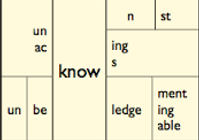Theory of Action
Theory of Change



PROGRam theory
Evaluation Strategy ~ Enlightenment
The enlightenment strategy will provide the direction for the evaluation. This strategy will use the evaluation to provide qualitative and quantitative information for program improvements. It will examine the underlying assumptions and mechanisms to ensure proper implementation. The enlightenment strategy will
help determine the overall quality of implementation and strategies will be fomulated in systematically. (Chen, ) It looks at how Structured Word Inquiry is being implemented as well as improvements. Using this theory-driven process evaluation, unintended results will be analyzed in addition to the intended results.
Evaluation Approach ~ Holistic Assessment
The Holistic Assessment will evaluate the program for improvement needs and accountability. It will look at the implementation for change with process -theory evaluation. The holistic assessment approach will take into account the complex interactions between content, teaching style and student needs. The evaluation will take into consideration the teacher's knowledge, involvement, the group of students, individual students and the support the teachers have as well as the program of Structured Word Inquiry.
Will investigation of organized spelling patterns, connections of meaning be a more engaging, motivating way to teach students vocabulary, decoding and spelling skills?
If teachers lead with the structured word inquiry approach then students will be able to transfer their learning to new contexts, beyond memorization and lead to understanding.
Considerations:
Capacity building: teacher trained in the program will provide direct and indirect support to 3 teachers to facilitated implementation in the classroom. Resources and modeled teaching will support the teacher-directed inquiry with gradual release to teachers during inquiry based learning. Evaluation will be conducted to determine effectiveness. Will teachers become competent and confident in supporting the inquiry process with students? Weekly meetings will be held to support questions, model effective practice and provide resources. With increased knowledge and understanding the goal would be to have the success shared in order to expand the program to include other teachers and their students. Parents will be involved to foster inquiry to extend beyond the school to home.
Target population: Students language skills and working vocabulary have a range. Teacher directed lessons will build from the basic word structure of common suffixes and prefixes. During inquiry-led times, students work at their level to inquire about word structures. Additional support will be provided to those with reading disabilities.
The target population of grade 4 students were chosen for the following reason:
-willingness of teachers to invest time leaning a new program to teach students using an inquiry approach
-currently no spelling program in place
-students are demonstrating poor spelling skills
-building on staff knowledge as funding is limited to implement programs
-many free resources with positive researched results regarding Structured Word Inquiry
Feedback Loops: Ongoing interaction of the change model and theory of action ensure proper implementation and monitoring based on process evaluation.
Holistic Assessment: Through looking at the implementation of Structured Word Inquiry, an assessment can be made on the effectiveness, and possible areas that need to be changed in order for it to be successful. The evaluator will look at assumptions made that enhance or detract from the success. In holistic assessment, information can be obtained by goal achievement, the effectiveness of implementation of the action model and look at underlying causes.
Stakeholder Theory: Structured Word Inquiry is a program based on Scientific Theory, with the program based on the study of morphology and the effects on students understanding of the English Language and the orthography. As the program is implemented in a variety of environments and formats, the evaluation is based on Stakeholder Theory. It looks at assumptions, past experiences, other programs and discussions with peers in combination with scientific theory.
Assumptions:
*students have background knowledge of phonological awareness to decode word parts
*all students will benefit, including those with learning challenges
*students will have access to online tools to support their inquiry
Barriers: (to be further developed)
*teachers' commitment to learning
*teachers becoming comfortable with learning alongside of students

click to return to top of the page
Student focused learning with inquiry through scientific word study approach.

